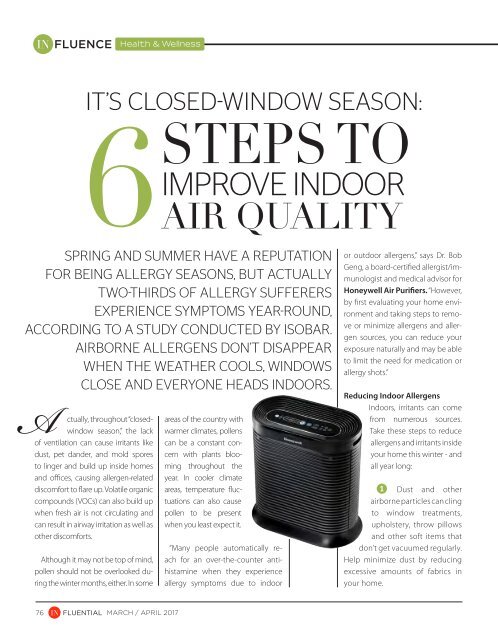InFluential_Magazine_March_April_2017
You also want an ePaper? Increase the reach of your titles
YUMPU automatically turns print PDFs into web optimized ePapers that Google loves.
IN FLUENCE<br />
Health & Wellness<br />
IT’S CLOSED-WINDOW SEASON:<br />
STEPS TO<br />
6IMPROVE INDOOR<br />
AIR QUALITY<br />
SPRING AND SUMMER HAVE A REPUTATION<br />
FOR BEING ALLERGY SEASONS, BUT ACTUALLY<br />
TWO-THIRDS OF ALLERGY SUFFERERS<br />
EXPERIENCE SYMPTOMS YEAR-ROUND,<br />
ACCORDING TO A STUDY CONDUCTED BY ISOBAR.<br />
AIRBORNE ALLERGENS DON’T DISAPPEAR<br />
WHEN THE WEATHER COOLS, WINDOWS<br />
CLOSE AND EVERYONE HEADS INDOORS.<br />
A<br />
ctually, throughout “closedwindow<br />
season,” the lack<br />
of ventilation can cause irritants like<br />
dust, pet dander, and mold spores<br />
to linger and build up inside homes<br />
and offices, causing allergen-related<br />
discomfort to flare up. Volatile organic<br />
compounds (VOCs) can also build up<br />
when fresh air is not circulating and<br />
can result in airway irritation as well as<br />
other discomforts.<br />
Although it may not be top of mind,<br />
pollen should not be overlooked during<br />
the winter months, either. In some<br />
areas of the country with<br />
warmer climates, pollens<br />
can be a constant concern<br />
with plants blooming<br />
throughout the<br />
year. In cooler climate<br />
areas, temperature fluctuations<br />
can also cause<br />
pollen to be present<br />
when you least expect it.<br />
“Many people automatically reach<br />
for an over-the-counter antihistamine<br />
when they experience<br />
allergy symptoms due to indoor<br />
or outdoor allergens,” says Dr. Bob<br />
Geng, a board-certified allergist/immunologist<br />
and medical advisor for<br />
Honeywell Air Purifiers. “However,<br />
by first evaluating your home environment<br />
and taking steps to remove<br />
or minimize allergens and allergen<br />
sources, you can reduce your<br />
exposure naturally and may be able<br />
to limit the need for medication or<br />
allergy shots.”<br />
Reducing Indoor Allergens<br />
Indoors, irritants can come<br />
from numerous sources.<br />
Take these steps to reduce<br />
allergens and irritants inside<br />
your home this winter - and<br />
all year long:<br />
1 Dust and other<br />
airborne particles can cling<br />
to window treatments,<br />
upholstery, throw pillows<br />
and other soft items that<br />
don’t get vacuumed regularly.<br />
Help minimize dust by reducing<br />
excessive amounts of fabrics in<br />
your home.<br />
76 FLUENTIAL<br />
MARCH / APRIL <strong>2017</strong>


















